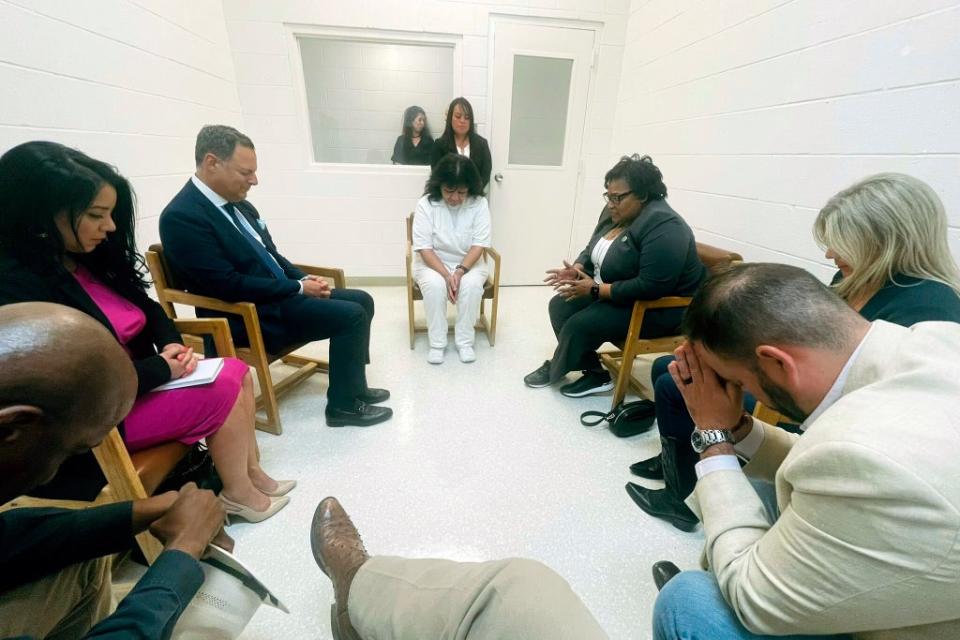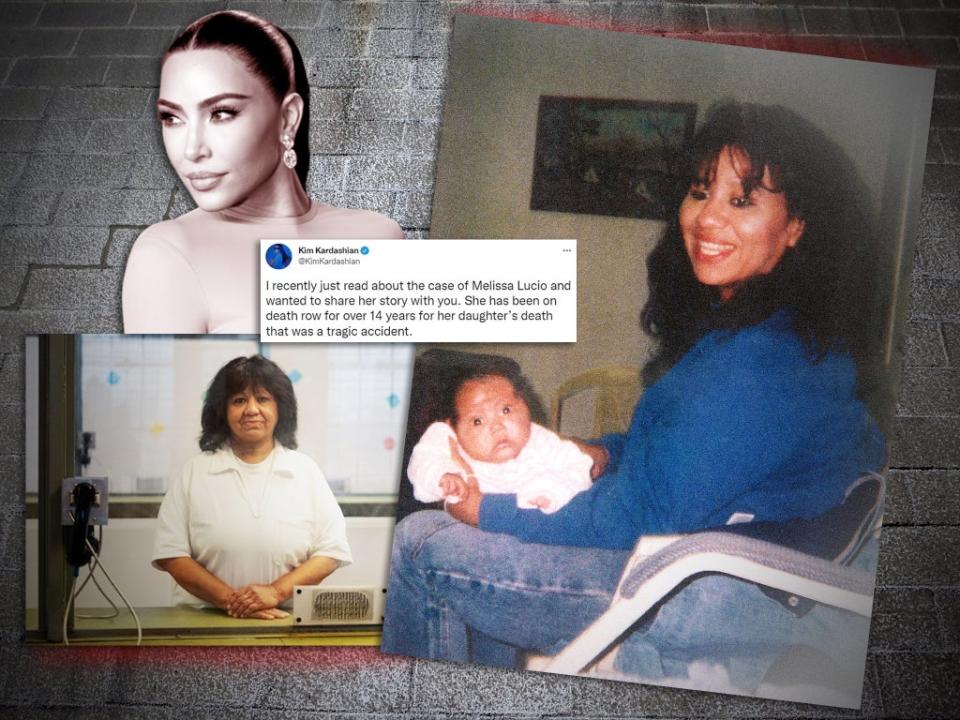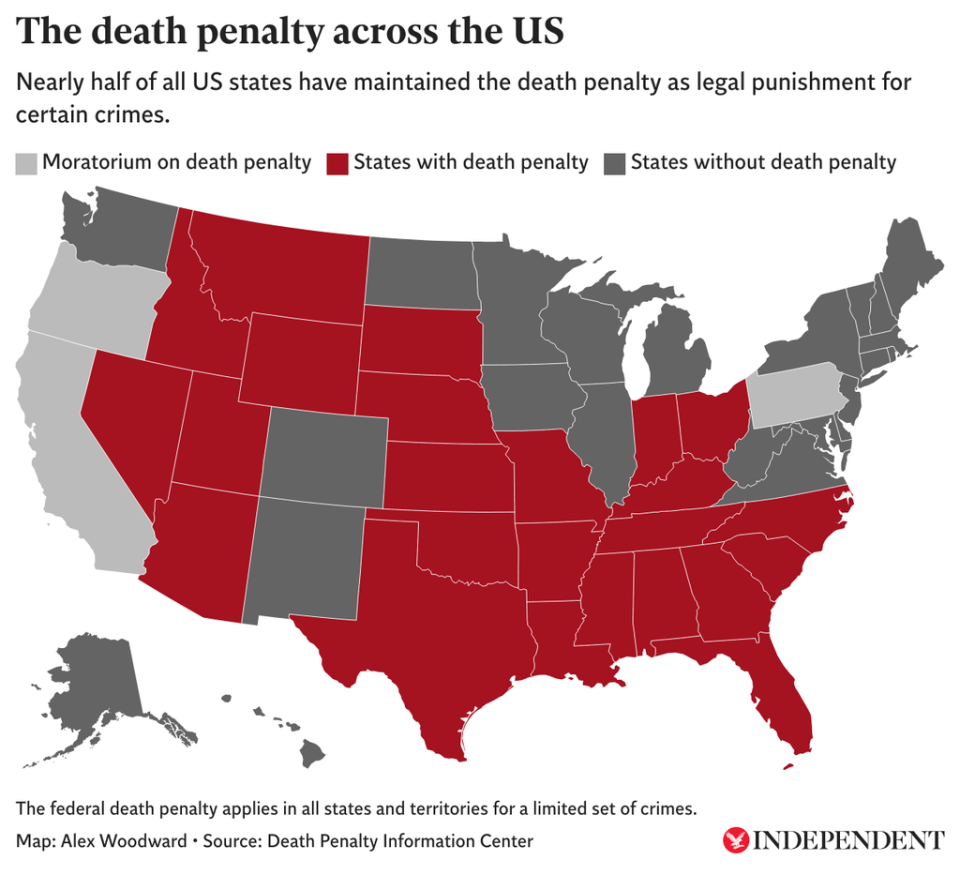Melissa Lucio ‘a symbol of wrongful convictions,’ documentary director says as execution approaches

Sabrina Van Tassel, director of the acclaimed 2020 documentary The State of Texas vs Melissa, will be the first to tell you, her film didn’t uncover new evidence about the case of Melissa Lucio, the female death row inmate in Texas who has inspired a nationwide innocence movement with support from the likes of Kim Kardashian.
Rather, the movie showed the many red flags in the prosecution that were always in plain sight. And for people like Melissa Lucio in the justice system — poor, Latinx, victims of abuse — even getting a second look is a rare, radical change in the status quo.
“Melissa would never be where she’s at if she wasn’t a poor Hispanic woman. That’s a fact,” Ms Van Tassel told The Independent.
“I have not discovered anything,” she continues. “I’m just basically putting together all these elements that were there for the justice system to see that they did not look at. I want the audience to realize that when you’re poor, this is the kind of thing that happens to you. I want people to realise that in America, you will not find one rich person on death row. Why is that? Our system is not only broken, but I think it was designed to put people like Melissa in prison.”
So here are those facts, which the documentary, now streaming on Hulu, lays out in detail, including featuring interviews from death row with Lucio herself.
Police arrested Melissa Lucio in 2007, after Mariah was found motionless on the floor of the crowded apartment where the family lived. The child showed signs of a broken arm untreated for weeks, a head injury, bite marks on her back, and bruises across her body. The official who carried out an autopsy on Mariah said it was one of the worst examples of child abuse she had ever seen.
But advocates argue the prosecution was more focused on securing a headline-grabbing verdict than finding the truth.
After being arrested, Lucio was interrogated for seven hours by a group of armed policemen, who berated her as she claimed her innocence over 100 times, according to a clemency application her attorneys have filed with Texas governor Greg Abbott. Lucio, who was grief-stricken, pregnant with twins at the time, and exhausted as questioning stretched to 3am, eventually appeared to admit to spanking and biting her child, which prosecutors alleged proved her guilt in Mariah’s death.

Experts assembled by the defence argue this harsh interrogation of the woman, a lifelong victim of sexual and physical abuse at the hands of men, seemed likely to produce a false confession under duress.
Some of the most harrowing footage in The State of Texas vs Melissa is from that interrogation, where officers loom over a bereft Lucio, who sits with a baby doll they’ve brought in to represent her dead daughter.
Neither Lucio’s lengthy file with state child protection officials, nor any eyewitness testimony, indicates she was ever physically violent with any of her children, though state officials had previously removed some of her kids from her care because of indications they were suffering from neglect.
Instead, Lucio, her defence team, and members of her family say Mariah was injured when falling down the stairs a few days before her death at the apartment, and was a target of abuse from her siblings, claims the 53-year-old’s attorney never raised in her defence during the trial.
Armando Villalobos, the “tough on crime” county prosecutor who led the case against Lucio, is currently serving a 13-year federal prison sentence on charges of bribery and extortion connected to a wide-ranging Texas corruption ring.

Despite nearly two decades of legal appeals, these complicating factors rarely made a difference to the state and federal officials overseeing Lucio’s case. Texas has executed the most people in modern US history, and the US Supreme Court extinguished Lucio’s final appeal. Lucio’s story seemed destined to fade into obscurity forever.
Twenty years after Lucio’s arrest, her family said Ms Van Tassel was the first reporter they’d met who seemed interested in hearing their side of the story.
“They were basically like, ‘We’re happy to see you,’” she recounted of her first trip to Texas. “‘You’re the very first reporter who has asked us any questions whatsoever about what happened, and this is what it is.”
They told her about the fall, the likely abuse from other siblings, the underwhelming defence and the zealous prosecution. A seemingly straightforward case of a neglectful mother committing a horrible crime suddenly became something far more complicated.
“Within an hour, being with her sister, she told me that Mariah had fallen down a flight of stairs, that Melissa had never been violent to her, and actually the family would always be pissed at Melissa because she was never grounding her kids,” the filmmaker said. “She was just way too lenient, and she was someone who had the tendency to never say anything to her kids, and that was driving the family crazy.”
Pretty soon, a lot more people would start asking questions.
More than half of the state’s Republican House of Representatives has joined in calls to stop the execution, either by commuting Lucio’s sentence or delaying it until more evidence can be considered.
“When we do everything that we can to ensure that an innocent Texan is not put to death by the state, or even a potentially innocent Texan is not put to death by the state … we are strengthening our criminal justice system,” GOP representative Jeff Leach of Plano, who co-chairs the House Criminal Justice Reform Caucus, said in March.
Kim Kardashian has thrown her influence behind the innocence campaign, as well, a move that Ms Van Tassel said she respects deeply. She spent years trying to get other notable figures interested in the case to little avail.
“I am so grateful because she has an incredible fame that she’s using in the right way,” she said. “With one tweet, she can change the life of a person and she does it. A lot of celebrities don’t do it.”

Supporters have created a petition on Lucio’s behalf, and are urging Texas governor Greg Abbott and state pardon and parole officials to consider clemency or an execution delay.
Without some form of intervention, Ms Lucio will be executed on 27 April.
Another notable element of the film is a question it asks that rarely comes up in the heated conversations around guilt and innocence that accompany high-profile death penalty cases: what is the point of this kind of punishment? Has it made the world a better place for the people most affected by the alleged crime?
After Ms Lucio was put on death row, her children were scattered across the state in the foster system, partially estranging them from each other and their mother for years.
“Every night, we would cry and say that we missed our mom. There’s all this time that was lost. If they actually investigated, ya know, looked into what happened, we wouldn’t be here. We’d be with her. Everything would’ve been different,” one of Melissa’s sons says in the film.
The Lucio family won’t ever get those years back, but Ms Van Tassel is hoping the public pressure around the case can keep them from losing more years with their mother if she’s truly innocent. No matter what happens, it’s clear that the name Melissa Lucio is no longer forgotten.
“Whether you are for or against the death penalty, one thing I’m convinced of is no American wants an innocent person to be executed. You have to make noise. Melissa has become a symbol against wrongful convictions,” she said. “Melissa’s case is not going to go away. If Melissa gets executed, it’s going to be a stain on the state of Texas for years to come.”
The Independent and the nonprofit Responsible Business Initiative for Justice (RBIJ) have launched a joint campaign calling for an end to the death penalty in the US. The RBIJ has attracted more than 150 well-known signatories to their Business Leaders Declaration Against the Death Penalty - with The Independent as the latest on the list. We join high-profile executives like Ariana Huffington, Facebook’s Sheryl Sandberg, and Virgin Group founder Sir Richard Branson as part of this initiative and are making a pledge to highlight the injustices of the death penalty in our coverage.

 Yahoo News
Yahoo News 
